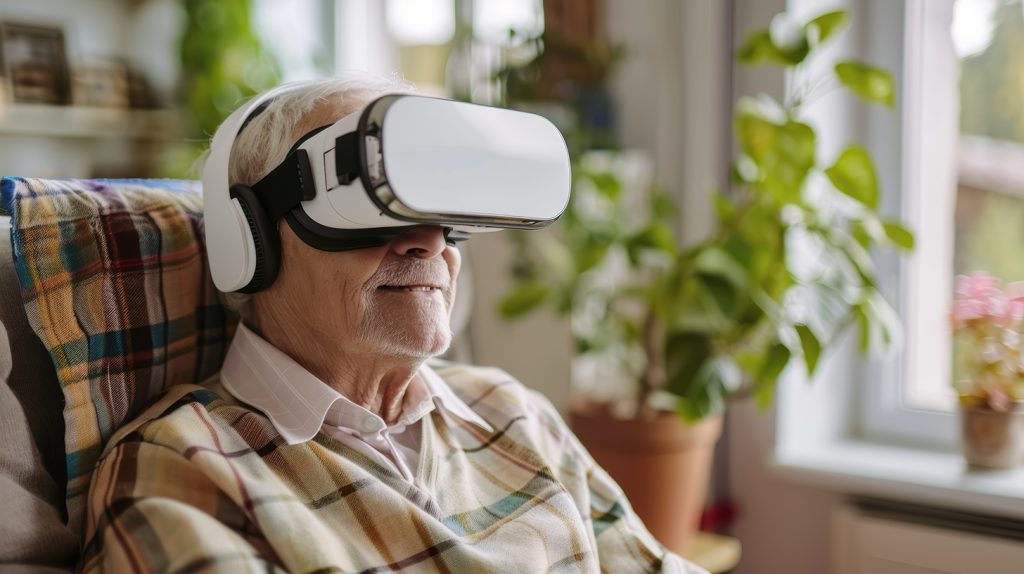Studies and expert opinions
Findings from science & research on the topic of VR
Virtual reality (VR) is often associated with younger generations and video games. However, more and more studies are proving the positive effects of VR use on older people, in particular a significant improvement in their state of mind.
Virtual reality and video games in cardiac rehabilitation programs. A systematic review: https://www.tandfonline.com/doi/full/10.1080/09638288.2019. 1631892
Immersive Virtual Reality for the Management of Pain in Community-Dwelling Older Adults: https://journals.sagepub.com/doi/10.1177/1539449218817291
Exergames in Augmented Reality for Older Adults with Hypertension: A Qualitative Study Exploring User Requirements: https://link.springer.com/chapter/10.1007/978-3-030-22015-0_18
Virtual reality exergame in older patients with hypertension: a preliminary study to determine load intensity and blood pressure: https://bmcgeriatr.biomedcentral.com/articles/10.1186/s12877-023-04245-x
Virtual Reality (VR)-Based Environmental Enrichment in Older Adults with Mild Cognitive Impairment (MCI) and Mild Dementia: https://www.ncbi.nlm.nih.gov/pmc/articles/PMC8392435/
Developing a virtual reality for people with dementia in nursing homes based on their psychological needs: a feasibility study: https://bmcgeriatr.biomedcentral.com/articles/10.1186/s12877-021-02125-w
Reminiscence therapy using virtual reality technology affects cognitive function and subjective well-being in older adults with dementia: https://www.tandfonline.com/doi/full/10.1080/23311908.2021.
1968991
Effects of Virtual Reality Intervention on Cognition and Motor Function in Older Adults With Mild Cognitive Impairment or Dementia: A Systematic Review and Meta-Analysis: https://pubmed.ncbi.nlm.nih.gov/34025384/
The Use of Virtual and Augmented Reality by Older Adults: Potentials and Challenges: https://www.frontiersin.org/articles/10.3389/frvir.2021.639718/ full
Older Adults With Cognitive and/or Physical Impairments Can Benefit From Immersive Virtual Reality Experiences: A Feasibility Study: https://pubmed.ncbi.nlm.nih.gov/32010701/
Virtual Reality-Based Cognitive Stimulation to Improve Cognitive Functioning in Community Elderly: A Controlled Study:https://pubmed.ncbi.nlm.nih.gov/32031888/
Using virtual reality for cognitive training of the elderly: https://pubmed.ncbi.nlm.nih.gov/25107931/
Exploring the potential of virtual worlds in engaging older people and supporting healthy aging: https://www.tandfonline.com/doi/abs/10.1080/0144929x.2012. 691552
Virtual Reality-Based Cognitive Stimulation to Improve Cognitive Functioning in Community Elderly: A Controlled Study:https://pubmed.ncbi.nlm.nih.gov/32031888/
The effect of virtual reality program on the cognitive function and balance of the people with mild cognitive impairment: https://www.ncbi.nlm.nih.gov/pmc/articles/PMC5574359/
Albertus W. Faber, David R. Patterson, Marco Bremer; Repeated Use of Immersive Virtual Reality Therapy to Control Pain During Wound Dressing Changes in Pediatric and Adult Burn Patients, Journal of Burn Care & Research, Volume 34, Issue 5, September 1, 2013, Pages 563-568.
https://doi.org/10.1097/BCR.0b013e3182777904
Kevin M. Malloy and Leonard S. Milling: https://www.sciencedirect.com/science/article/pii/S0272735810 001091?via%3Dihub
Hoffman, H.G., Patterson, D.R., Carrougher, G.J., & Sharar, S. (2001). The effectiveness of virtual reality based pain control with multiple treatments. Clinical Journal of Pain, 17, 229-235.
http://www.hitl.washington.edu/research/burn/multiplepain.htm
Front. Med., July 14, 2023
Sec. Intensive Care Medicine and Anesthesiology
Volume 10 - 2023 | https://doi.org/10.3389/fmed.2023.1203670
Effectiveness of Virtual Reality-Based Rehabilitation Interventions in Improving Postoperative Outcomes for Orthopedic Surgery Patients. Alternative Treatments for Pain Medicine (C Robinson, Section Editor) Published: Volume 28, pages 37-45, (2024): https://link.springer.com/article/10.1007/s11916-023-01192-5
Virtual and augmented reality in intensive care medicine: a systematic review Annals of Intensive Care volume 13, Article number: 81 (2023): https://annalsofintensivecare.springeropen.com/articles/10.118 6/s13613-023-01176-z

Virtual travel increases the well-being of senior citizens
VR glasses make seniors feel happier and more relaxed.
The seniors in the VR group reported that they felt happier, more satisfied and more relaxed than the seniors in the control group.
The study* also revealed that spatial mobility is a factor influencing the effect of VR. The effect of VR was greatest for men and women with limited mobility.
*Study of the West Saxon University of Applied Sciences Zwickau 2023